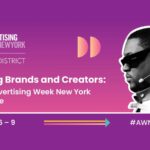On social media, “authenticity” may be king but AI influencers may force a redefinition. Are brands prepared for the new “authenticity”?
By Jason Mitchell, CEO, Movement Strategy
As a social media early adopter, I’ve always been open-minded to new technologies. So, this Fall, when Meta unveiled its AI Avatars – generative AI clones of celebrities like Snoop Dogg, Tom Brady, Paris Hilton, Kylie Jenner and Mr. Beast – I wasn’t as concerned as others seemed to be.
In fact, I thought it was exciting.
Not so much because I was looking forward to getting roasted by a fake Mr Beast or even because I think Meta’s particular brand of AI avatars will be successful. The truth is, no one can know that for sure. What I’m excited about is the amazing rate of change happening in this space. Remember, just a year ago, people were making fun of Mark Zuckerberg’s legless metaverse avatar. Now, they’ve already teased an updated, highly realistic version in Zuckerberg’s hour-long chat with AI researcher Lex Fridman.
Soon enough, thousands of companies will be able to do the same. And at least a few of them will change the world forever. This is like being alive when Gutenberg invented the printing press. We have a front row seat to one of the biggest technological and societal evolutions, ever.
As AI rises, it makes sense that people might assume that influencer marketing will be a casualty. Afterall, part of the appeal of following influencers on social media is that you start to feel like you know them. It can feel like a fairly intimate relationship, even though you have never actually met. This is why many influencers have moved from being larger than life to feeling more authentic, open and natural.
But while some would warn that AI will turn those relationships into something more artificial, I’d argue that AI-assisted avatars will take authenticity to the next level.
The new “authenticity”
A new definition of “authenticity” is coming to the world of influencer marketing, based on a limitless level of personalization. Actually, it’s already starting to happen – cases like Caryn Marjorie’s AI girlfriend where influencers create AI versions of themselves. Fans of these AI avatars can have 1:1 conversations with influencers directly. If that influencer has a wide body of work to learn from, which most do, the AI will be able to do an incredibly good job of communicating as if they were actually that person.
This will take the intimacy of that fan-to-influencer relationship to an entirely new level. It will give influencers an opportunity to actually have unique chats with each fan, something that would in no way be possible without AI. This will only increase the value that influencers have in the world and, in response, force brands to adapt their marketing approaches.
Consider the growing trend of new brands created by influencers – examples like Skimms, Fenty, Prime, and Feastibles that will only continue. Also take into account AI’s growing ability to localize video content for international markets, even changing the language people are speaking with impressive results. Realizing the power of their own brands, these influencers will take advantage of this new technology and continue to grow their market share against more traditional and established brands unless they keep up.
Realistically, not every brand will be able to navigate this AI-driven evolution perfectly. There will be brands that embrace this new technology and use it to properly drive attention towards their brand and win. There will also be legacy brands that are scared (for good reason) and so will fail to take advantage of these opportunities and lose out. But regardless of the risks, brands can’t afford to sidestep the experimentation necessary to get comfortable with AI. The alternative is to eventually be seen as less “authentic” by an increasingly demanding online audience.
Change is inevitable
Brands and their marketing partners must not fall victim to fear in the face of AI influencers. Afterall, this trend isn’t entirely unique. We know from experience that as technology continues to get better and better, the risk of getting it wrong comes down.
Remember, when social media started out, there were similar debates about the risks and benefits for brands. Back then, it was harder to see all of the negative externalities we now know to be true. It was also hard to see all of the positives – community building, democratization of information, global collaboration, giving voice to the disenfranchised and more. Even now, some might say it’s hard to know if social media has made the world better or worse, overall. But we do know that it is essential to the way we live our lives. And we also know what happened to the brands that decided to sit social media out.
AI poses something similar. And the only sure bet is that there’s no stopping it. So, as influencers begin to explore AI tools, brands should continue to embrace innovation and play their part in defining the future of marketing or risk falling behind.
About the Author
Jason Mitchell is the co-founder and CEO of social media agency Movement Strategy








